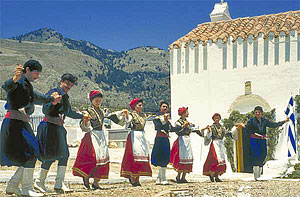|
Gerontikos
Gerontikos ( el, γεροντικός ) is the Greek name for the traditional Starsko Oro (Slavic) dance of the Florina region of Greece. Both names translate as the “old men’s dance.” Although this traditional men’s dance is rarely danced recreationally anymore, it is frequently performed on stage by Florina’s dance groups. It is a dance that begins with very slow, deliberate steps and later often segues into the more up-tempo Leventikos, or Pusteno (Slavic). The step pattern is structurally related to Berance, a dance just across the border in the Republic of Macedonia. Two traditional Slavic Macedonian ballads with bandit themes dating back to the years of Ottoman rule in the Balkans, Ibraim Odza and Dafino Vino Crveno, are commonly played instrumentally for stage performances of the Gerondikos by Greek dance organizations. The poetic meter of these ballads may be the determining factor for their unusual 12/8 (alternating measures of 7 and 5) musical meter and its varia ... [...More Info...] [...Related Items...] OR: [Wikipedia] [Google] [Baidu] |
Greek Dances
Greek dance (''choros'') is a very old tradition, being referred to by authors such as Plato, Aristotle, Plutarch and Lucian. There are different styles and interpretations from all of the islands and surrounding mainland areas. Each region formed its own choreography and style to fit in with their own ways. For example, island dances have more of a different smooth flow to them, while Pontic dancing closer to the Black Sea, is very sharp. There are over 10,000 traditional dances that come from all regions of Greece. There are also pan-Hellenic dances, which have been adopted throughout the Greek world. These include specifically the Syrtos, Kalamatianos, Pyrrhichios, Ballos and hasapiko. Traditional Greek dancing has a primarily social function. It brings the community together at key points of the year, such as Easter, the grape harvest or patronal festivals; and at key points in the lives of individuals and families, such as weddings. For this reason, tradition frequently dict ... [...More Info...] [...Related Items...] OR: [Wikipedia] [Google] [Baidu] |
Music Of Greece
The music of Greece is as diverse and celebrated as its history. Greek music separates into two parts: Greek traditional music and Byzantine music. These compositions have existed for millennia: they originated in the Byzantine period and Greek antiquity; there is a continuous development which appears in the language, the rhythm, the structure and the melody. Music is a significant aspect of Hellenic culture, both within Greece and in the diaspora. Greek musical history Greek musical history extends far back into ancient Greece, since music was a major part of ancient Greek theater. Later influences from the Roman Empire, Eastern Europe and the Byzantine Empire changed the form and style of Greek music. In the 19th century, opera composers, like Nikolaos Mantzaros (1795–1872), Spyridon Xyndas (1812–1896) and Spyridon Samaras (1861–1917) and symphonists, like Dimitris Lialios and Dionysios Rodotheatos revitalized Greek art music. However, the diverse history of art music ... [...More Info...] [...Related Items...] OR: [Wikipedia] [Google] [Baidu] |
Greek Folk Music
Greek traditional music (Greek: παραδοσιακή μουσική, "traditional music"; also δημοτικά τραγούδια, "folk songs") includes a variety of Greek styles played by ethnic Greeks in Greece, Cyprus, Australia, the United States and other parts of Europe. Apart from the common music found generally in Greece, each region of Greece contains a distinct type of folk music that originated from the region due to their history, traditions and cultural influences. Overview Greek folk music originally, predominantly contained one genre, known as Greek ''Demotiko (or Demotic/Paradosiako).'' This refers to the traditional Greek popular songs and music of mainland Greece and islands, which date back to the Byzantine times. It was the sole popular musical genre of the Greek people until the spread of ''Rebetiko'' and '' Laiko'' (other genres of folk music) in the early 20th century, spread by the Greek refugees from Asia Minor. This style of music evolved from ... [...More Info...] [...Related Items...] OR: [Wikipedia] [Google] [Baidu] |
Greek Music
The music of Greece is as diverse and celebrated as its History of Greece, history. Greek music separates into two parts: Greek folk music, Greek traditional music and Byzantine music. These compositions have existed for millennia: they originated in the Byzantine empire, Byzantine period and ancient Greek music, Greek antiquity; there is a continuous development which appears in the language, the rhythm, the structure and the melody. Music is a significant aspect of Greek culture, Hellenic culture, both within Greece and in the Greek diaspora, diaspora. Greek musical history Greek musical history extends far back into ancient Greece, since music was a major part of ancient Greek theater. Later influences from the Roman Empire, Eastern Europe and the Byzantine Empire changed the form and style of Greek music. In the 19th century, opera composers, like Nikolaos Mantzaros (1795–1872), Spyridon Xyndas (1812–1896) and Spyridon Samaras (1861–1917) and symphonists, like Dimitris ... [...More Info...] [...Related Items...] OR: [Wikipedia] [Google] [Baidu] |



